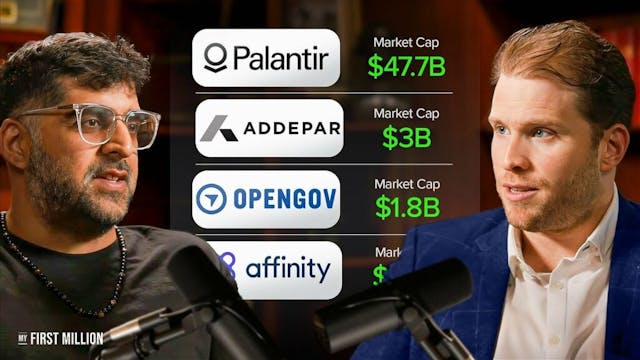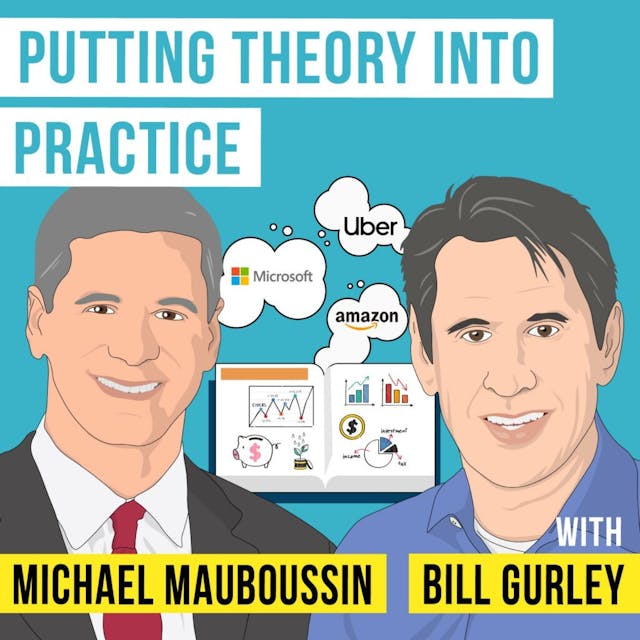
May 19, 2024
Michael Jordan In His Own Words | Founders Podcast with David Senra
- Check out the episode page
Key Takeaways
- Over two decades, Jordan’s brand has grown to generate $3.6 billion annually, a sevenfold increase
- Like Steve Jobs, Jeff Bezos, and Warren Buffett, Jordan has a few core ideas he repeats throughout his life: There are no shortcuts, actions speak louder than words, follow your instincts…
- If you want to be truly great at something, find work that feels like play. No motivation? Maybe there is a misalignment between your profession and your true interests
- Coach Herring gave him the life motto, “It’s hard, but it’s fair.”
- The rigorous routine that laid the groundwork for Jordan’s relentless pursuit of improvement: Coach Herring would pick him up every morning during his junior year of high school, take him to the gym for workouts before school started, tell him to get his grades up…
- Buffett invited Jordan onto his boat, even though Jordan was afraid of water. During their time together, Jordan took the chance to talk to Buffett about decision-making. Buffett’s advice was simple: Trust your gut and don’t ignore your intuition. Jordan was the same way
- Of all the things he was involved in, Jordan’s strongest passion is the Jordan Brand because he can impact that in a much greater sense than owning an NBA team
- You have to take the negatives and turn them into positives
- Michael Jordan’s biggest regret? “I don’t have regrets. To win, you have to lose. To be successful, you have to have something that wasn’t successful. To be happy, you have to have disappointment.” – Michael Jordan
- Both Jordan and Bezos emphasize the importance of preparation. By taking control of what you can—through work and preparation—you mitigate stress and eliminate fear
- The Zen principle Phil Jackson used to coach Michael Jordan: Allow whatever is going to happen to happen in its rhythm
Intro
- What David Senra (@FoundersPodcast) learned from reading Michael Jordan’s book, “Driven From Within,” written during his career peak
03:58 – Brand Jordan
- Over two decades, Jordan Brand has grown to generate $3.6 billion annually, a sevenfold increase
- When he signed with Nike, their annual revenue was $25 million, and large endorsement contracts for athletes were around $100,000
- “No one could have predicted the outcome because I was never following someone’s lead or operating off an existing model. There were no models for what happened at Nike.” – Michael Jordan
- Great companies are like great teams: Dedication to practice and performance under pressure
- Like Steve Jobs, Jeff Bezos, and Warren Buffett, Jordan has a few core ideas he repeats throughout his life: There are no shortcuts, actions speak louder than words, follow your instincts…
- Jordan’s commitment to practice was a key element of his success: “What really surprised me is his complete dedication to practice, and how much he talks about it over and over again. And that is one of the main ideas I learned from Jordan that I don’t think I’ll ever forget.” – David Senra
- The values that form the foundation of his playing career are the same values that define Brand Jordan
- In the past, players like Jordan had to prove their abilities before receiving significant rewards, whereas today, young players often receive rewards based on future potential, which Jordan believes could be detrimental
- If you want to be truly great at something, find work that feels like play. No motivation? Maybe there is a misalignment between your profession and your true interests
14:07 – Desire To Improve
- His development began with his first mentor, coach Clifton “Pop” Herring, who saw potential in Jordan that others did not
- Coach Herring gave him the life motto, “It’s hard, but it’s fair.”
- The rigorous routine that laid the groundwork for Jordan’s relentless pursuit of improvement: Coach Herring would pick him up every morning during his junior year of high school, take him to the gym for workouts before school started, tell him to get his grades up…
- Sometimes Jordan hated it, but it instilled a sense of discipline and focus
- Having a motivation bigger than yourself: He believed in playing for the fans who worked hard to afford tickets to see him play. This sense of duty and service to others was a key driver to give his best
- Jordan started with low expectations: Be the best player at the local park, then in the neighborhood. Each achievement boosted his confidence and set higher goals: varsity team, college scholarship, college championships, and NBA success
- This incremental goal-setting approach, combined with a focus on fundamentals, fueled his continuous improvement and confidence
- When Jordan joined the Chicago Bulls, his work ethic immediately set him apart. His practice habits and competitive spirit were unmatched
28:05 – Mastering Decision Making
- Michael Jordan met Warren Buffett in Omaha during a Coca-Cola tour
- Buffett invited Jordan onto his boat, even though Jordan was afraid of water. During their time together, Jordan took the chance to talk to Buffett about decision-making. Buffett’s advice was simple: Trust your gut and don’t ignore your intuition. Jordan was the same way
- Jordan consistently played hard regardless of the size of the audience. He often quoted Steve Jobs: “Be a yardstick for quality. Some people aren’t used to an environment where excellence is expected.”
- In his Hall of Fame speech, he stated, “Limits, like fears, are often just an illusion.”
- Jordan never took days off, setting a high standard for the Bulls
- His leadership involved being willing to sacrifice and holding others to high standards. He criticized teammates who did not meet these standards
- Jordan encouraged playing through pain and not showing weakness. During the famous flu game (later revealed as food poisoning), he played anyway
- Jordan echoed Henry Ford’s belief in serving customers first and criticized players who did not play hard for the paying fans
- Jordan demanded loyalty to Nike from those around him. He once destroyed a friend’s Puma gear!
45:00 – The Extreme Mindset of Michael Jordan
- During the 1992 Barcelona Olympics, Jordan was surprised to learn how lazy many of his teammates were about practice
- He goes, “I watched their practice habits. They’re deceiving themselves about what the game requires.” – Michael Jordan
- Even when you got to that level, they didn’t understand the importance of practice
- Just to put things in perspective, only about 400 players make it to the NBA, and then an even smaller number become All-Stars. An even smaller number are chosen for the Olympic team. This is who Jordan is talking about.
- If you are authentic to yourself, you can’t follow a fad, as it’s not sustainable
- He is not one for shortcuts: “We have become a shortcut culture. To a certain degree, we define success based on fictional attributes. If a guy has commercials, a lot of money, the girls, the car, then he’s considered successful, whether his performance matches all those things or not. “ – Michael Jordan
- If you’re making decisions from your instinct, that’s the only way you’re going to have long-term success: “Success to me has nothing to do with how much money you have or what kind of car you drive. I always wanted to know where I fit in with the best. Authenticity is about being true to who you are even when everyone else wants you to be someone else. It is a lot harder to become the best you can be when you’re focused on trying to be the best version of someone else. There’s nothing authentic in that. And if it’s not authentic, then it’s not going to last.” – Michael Jordan
- Of all the things he was involved in, Jordan’s strongest passion is the Jordan Brand because he can impact that in a much greater sense than owning an NBA team
- You have to take the negatives and turn them into positives
- From Nike’s “Failure” ad: “I’ve missed more than 9,000 shots in my career. I’ve lost almost 300 games. 26 times, I’ve been trusted to take the game-winning shot and missed. I’ve failed over and over and over again in my life, and that is why I succeed.” – Michael Jordan
- Michael Jordan’s biggest regret? “I don’t have regrets. To win, you have to lose. To be successful, you have to have something that wasn’t successful. To be happy, you have to have disappointment.” – Michael Jordan
53:54 – Work Ethic Eliminates Fear
- “The mind will play tricks on you… But you have to see past that, turn it all off if you’re going to get where you want to be.” – Michael Jordan
- This idea parallels Jeff Bezos’s view that “Stress primarily comes from not taking action over something that you can have some control over.” Both Jordan and Bezos emphasize the importance of preparation. By taking control of what you can—through work and preparation—you mitigate stress and eliminate fear
- The effort you invest consistently over time culminates in your performance during critical moments. Jordan points out, “At that moment, you were the sum total of all the work you have put in, nothing more and nothing less. If you are confident that you have done everything possible to prepare yourself, then there is nothing to fear.”
- Jordan says the same idea over again about the importance of having control over your mind: A lot of people can run and jump and shoot, but they don’t have the killer instinct and the confidence
- The Zen principle Phil Jackson used to coach Michael Jordan: Allow whatever is going to happen to happen in its rhythm



